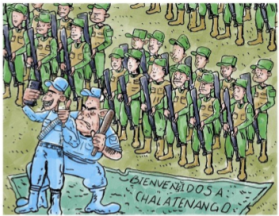Now Serving the Pueblo: Ministry of Education is
by Erika Del Cid, National Office Intern
Sincethe beginning of Mauricio Funes' presidency in El Salvador in June 2009, theMinistry of Education (MINED) has created several new plans and initiatives tohelp students from low income families and to educate all students moreeffectively.
TheMinister of Education is Salvador Sánchez Cerén, who also serves as thecountry’s Vice-President. Known during the 1980s as “Leonel”, he is a long-timeand well-respected leader of the FMLN, having served as a commander during thewar and later as head of the party’s legislative fraction. He got his startorganizing in the 1970’s as a member of the teacher’s union. One of the party’shighest priorities after the 2009 victory was to ensure that FMLN leaderscommitted to the ideals of a people-centered government took the helm of theministries whose work is closest to the people, such as education andhealth.
Thelargest task for Sánchez Cerén as Minister of Education is to lower illiteracyrates and improve access to education. The goal is to reduce illiteracy ratesfrom 17.9% to 16.1% in 2010, and to 4% by 2014. There are clear demographicinequalities that have determined who has received a good education in the pastand who has not; about 62% of people who are illiterate are female and fromrural areas. The Ministry's new programs are meant to address these systemicinequalities.
“Notknowing how to read nor write is not being prepared for life,” says SánchezCerén. The “Educating for Life” program was inaugurated last March. The MINEDis not alone in its efforts, having united with social organizations,international groups, universities, churches, and the academic sector to bringeducational opportunities to people who previously didn’t have access toeducation. The “Educating for Life” program is part of a larger plan to fosterequality and to fight against poverty and social exclusion by preparingstudents with skills.
Onecentral component of the new illiteracy program is El Salvador’s reneweddiplomatic relations and collaboration with Cuba, which implemented one of theworld’s most successful campaigns to end illiteracy. Not surprisingly, theright-wing media in El Salvador has accused Sánchez Cerén of “communistindoctrination”! Computerliteracy is another key goal of the MINED, and two programs have been createdin this area. The first Center for Refurbished Computers was inaugurated onJuly 27 in La Paz with the goal of educating people, especially in rural areas,on technological tools. The “Computers for My School” program is meant toimprove the technology that schools are currently using and improve teachingmethods.
Thecomputers and other hardware used for these centers are donated from thegovernment and the private sector. This equipment is then refurbished andinstalled by recent graduates from technical schools, providing a key source ofemployment for Salvadorans who have valuable technical skills.
Thepublic schools in El Salvador have been historically underfunded, andrequirements that parents provide their children with uniforms and schoolsupplies, have been a barrier to many children pursuing their constitutionalright to education. One of the most successful and popular programs of theMinistry thus far has been to contract with local producers in every departmentto provide uniforms and shoes for all students, especially those in ruralareas. As of July 2010, one year into the program, over ninety percent ofschools had received the materials; parents and teachers are thrilled.
TheMINED is also working to expand nutritional aid to schools. Under the Programfor School Nutrition and Health, more than 4,000 schools will receive $27million of milk, beans, rice, sugar, oil, and health drinks for over 1.3million students. There is hope that better school nutrition will lead to fewerstudents repeating a grade, higher attendance, and higher graduationrates.
Thearts have not been forgotten in the new administration’s plans. The Ministryhas initiated a new program called “Art, Culture, Recreation, and Sports.” InLa Unión, the first Festival of Folk Dance took place in July, in which morethan 15 schools from the surrounding area participated.
TheNational Association of Salvadoran Educators (ANDES-21 de Julio), thehistorically militant teachers’ union, has been supportive of the newinitiatives. Isreal Montano, Secretary General of ANDES, stresses theimportance of projects centered on arts, culture, and sports. “Through schooland the engagement of the teachers, we will improve the conditions of ourcountry to prevent the high rates of violence that are being seen.”
TheNational Network of Educators has been created by the MINED to give teachersdirect involvement in the formation of well-rounded students. Sandra Alas, anational coordinator of the Network, which includes 3,000 teachers, said saysthat education is “one of the fundamental professions for the development ofthe state.”
Overall,the general public approves very highly of the new education programs.According to a recent national poll, 80.4% of Salvadorans approve of the way inwhich the Administration and Ministry are directing the educational system.This approval rating was highest for education, among health, transparency& anti-corruption, attention to women and children, and local development,all of which had over 60% approval ratings.
SánchezCerén is enthusiastic about the changes, and says, “We are looking tostrengthen the students’ knowledge, for example, in the arts, culture, andscience. We want to create from a student a critical, thinking young adult.” n

 "I am a CISPES supporter because continuing to fight for social justice and a more people-centered country means continuing the dream and sacrifice of thousands of my fellow Salvadorans who died for that vision.” - Padre Carlos, New York City
"I am a CISPES supporter because continuing to fight for social justice and a more people-centered country means continuing the dream and sacrifice of thousands of my fellow Salvadorans who died for that vision.” - Padre Carlos, New York City

